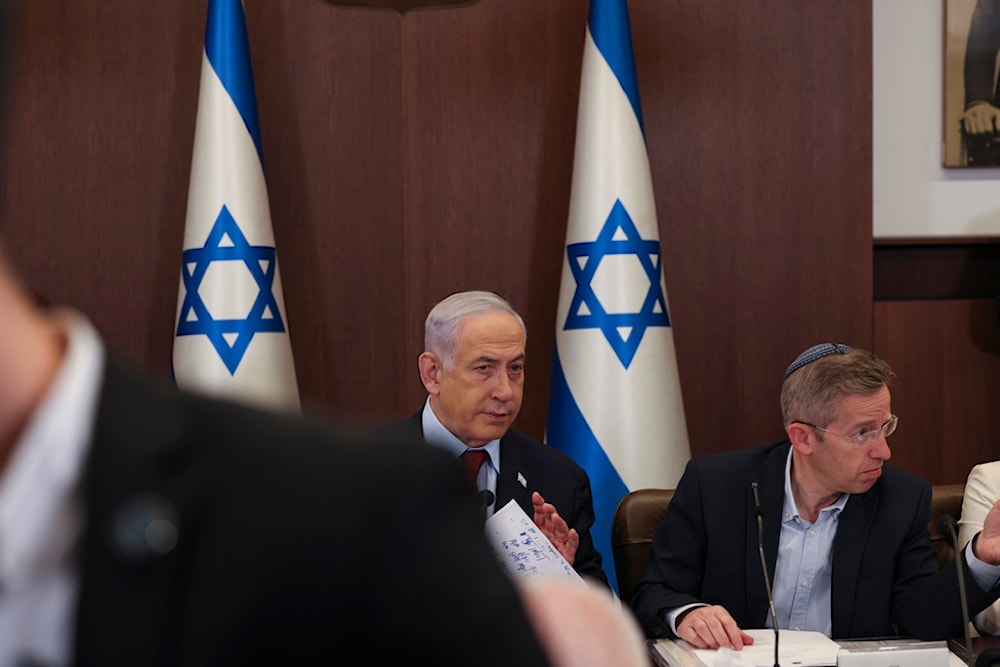Netanyahu reiterates intention to rule Gaza militarly if he wins
Israeli Prime Minister Benjamin Netanyahu says he is in pursuit of a demilitarized Gaza Strip as he underlines the need for "Israel" to control Gaza.
-

Israeli Prime Minister Benjamin Netanyahu attends the weekly cabinet meeting at the Prime Minister's office in occupied al-Quds, occupied Palestine December 10, 2023 (AP)
The Gaza Strip, or as Israeli Prime Minister Benjamin Netanyahu called it during a public address in "Tel Aviv" on Saturday, "Hamastan", will not be run by the Palestinian Authority, or as he said, "turn into Fatahstan", going against the wishes of the Israeli occupation's closest allies, the United States.
The Israeli premier underlined that he wanted the Gaza Strip to be demilitarized, or rather pledged that it would be so, and added that the Israeli occupation forces would "be responsible for security in the Gaza Strip."
His explanation for wanting to demilitarize Gaza instead of keeping it Palestinian or doing as the US wishes, i.e., handing it over to the Palestinian Authority is a survey conducted in the West Bank, wherein 82% of Palestinians said they supported Operation al-Aqsa Flood carried out by the Palestinian Resistance against the Israeli occupation forces on October 7.
Netanyahu said earlier Tuesday that "Israel" was preparing for the possibility of "waging war" against the security forces affiliated with the Palestinian Authority amid discussions about concessions to the Palestinians and dealing with bringing Palestinian workers to "Israel."
In a closed discussion held in the Foreign Affairs and Security Committee of the occupation, Knesset members asked Netanyahu about the possibility of an alternative scenario wherein the Palestinian Authority's security forces would aim their rifles at the occupation forces in the West Bank, as part of possible cooperation with Hamas.
Netanyahu, according to Israeli Channel 2, said the "coup scenario is familiar and is up for discussion," adding that in the case this scenario is realized, the IOF would respond within minutes.
Moreover, he completely dismissed any diplomatic solution and justified the ongoing genocide by saying that "only military pressure" got the captives out of Gaza during the ceasefire reached in November, going on to say that only that would secure the release of the remainder of the captives. "Without it, we have nothing," he maintained.
Talking about Hamas' conditions for a deal that would see the captives released, Netanyahu said: "They have all kinds of demands" including that "the war end and [the occupation's] troops are booted out… The minute we capitulate to that, Hamas wins. And we are obligated to eliminate [Hamas] and to get all the hostages back."
Netanyahu against Oslo
He added that he "inherited the Oslo Accords," noting that "the decision to bring the PLO from Tunis and plant it in the heart of [the West Bank], and in Gaza, was a decision made and implemented before I became prime minister. I thought it was a terrible mistake and I still do."
"You and your journalist friends have been blaming me for almost 30 years for putting the brakes on the Oslo Accords and preventing the Palestinian state. That's true," he told a reporter who asked him why he did not withdraw from the aforementioned agreement if he was so critical of it.
The Israeli premier boasted that he "prevented the establishment of a Palestinian state" adding that everybody today "understands what the Palestinian state could have been now that we've seen the little Palestinian state in Gaza."
In the aforementioned discussions that took place earlier in the week, Netanyahu said, "The Oslo Accords were a disaster that resulted in the same number of casualties as the October 7 attack but over a longer period."
IOF to 'deter' Hezbollah in north
Once Hamas is "destroyed," as Netanyahu put it, the Israeli occupation will turn its focus to the north and "deter Hezbollah".
Either there will be a diplomatic situation on the northern border, "or there will be a different way" to solve the situation, he claimed.
He added that there were talks about the issue with the United States, which is likely to be all in for a "diplomatic solution".
Israeli media highlighted the frustration experienced by residents of northern Israeli settlements due to the Israeli government's handling of the tense situation along the border with Lebanon.
David Azoulay, the head of the "Metula" settlement council, told the Israeli Channel 13 that a situation under which a heavy presence of Israeli soldiers is present in "Metula" cannot be tolerated, implying that settlers "cannot enter" under such circumstances.
Azoulay underlined that having Israeli soldiers within the settlements is not a solution, nor does it provide security or a sense of security amid the ongoing situation.
He continued, "I want and ask the Israeli government to tell us only what it intends to do and when. This is what we want to know," adding, "We are frustrated."
A couple of days ago, the same Israeli official confirmed that all "civilian" infrastructure in Israeli settlements within 4 kilometers of the border with Lebanon is not operational due to ongoing Hezbollah attacks.
In a related context, the head of the Israeli occupation Regional Council in Upper al-Jalil, Giora Zaltz, commented on the fact that Islamic Resistance operations continue in the direction of northern occupied Palestine, criticizing the conduct of Benjamin Netanyahu's government.
This comes as the fighters of the Lebanese Islamic Resistance - Hezbollah continue to carry out operations against Israeli occupation forces on the borders with occupied Palestine in support of the Palestinian Resistance in Gaza, amid the ongoing Israeli brutal war on the Strip.

 6 Min Read
6 Min Read








